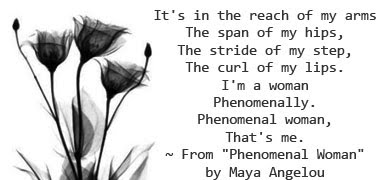[Trigger warning for a depiction of rape and a discussion of bondage play.]
The other night I had the following funky dream. It consisted of two parts. Part 1 involved me in my own apartment (possibly my current one) but there was a man, an older established man, dressed in a business suit. I didn't see his face, but I knew that he was going to rape me. The act wasn't depicted in the dream, but I remember feeling terrified. He was lurking in the apartment in a predatory way and possibly undressing. I was dressed, I think, but I was in bed, feeling vulnerable. There was a distinct feeling of danger, panic, disempowerment, and fear. The possibility of him approaching me, forcing me to have sex with him when I didn't want to, was not sexy; it was assaultive.
Part 2, a distinctly separate scenario in the same dream, involved a short scene in which a man (no one in particular, actually; he was more of an amorphous though definitely male presence) was dominating me in a sexy play. I think I was tied to an indoor railing of some sort, and no sex was actually going on. Rather, he was near me and I felt completely submitted to his dominant character. I was fully entrusting and in fact letting go of any fear. There was not a slightest hint of danger in the air; all I felt was a pleasurable calmness and safe surrender.
I know that at least light forms of bondage have long entered the sex talk in pop culture: fuzzy handcuffs, blindfolds, black leather. But as a feminist, I was reluctant to accept such gendered play–specifically when the man dominates and the woman submits–in my own sex life. There was something I liked about the trust and surrender of these scenarios, but it still felt completely counterintuitive. Wouldn't I be letting down my fellow sisters who continued to advocate for women's voices and "no means no" campaigns?
I think this dream was my instinctive answer, a communication about something I probably already knew. I was confabulating the two scenarios in my reasoning, but here I was able to feel, on a visceral level, their stark difference: the fear and helplessness on the one hand, and the assured succumbing on the other. Consent, trust, and communication are key elements of dream part 2, and there is nothing unfeminist about that. Conversely, there is nothing feminist about policing our own sexualities and being afraid to ask for the things we want. Through this I realized that actually, all things (pleasurable) are possible in a caring, responsive, and egalitarian partnership.
The other night I had the following funky dream. It consisted of two parts. Part 1 involved me in my own apartment (possibly my current one) but there was a man, an older established man, dressed in a business suit. I didn't see his face, but I knew that he was going to rape me. The act wasn't depicted in the dream, but I remember feeling terrified. He was lurking in the apartment in a predatory way and possibly undressing. I was dressed, I think, but I was in bed, feeling vulnerable. There was a distinct feeling of danger, panic, disempowerment, and fear. The possibility of him approaching me, forcing me to have sex with him when I didn't want to, was not sexy; it was assaultive.
Part 2, a distinctly separate scenario in the same dream, involved a short scene in which a man (no one in particular, actually; he was more of an amorphous though definitely male presence) was dominating me in a sexy play. I think I was tied to an indoor railing of some sort, and no sex was actually going on. Rather, he was near me and I felt completely submitted to his dominant character. I was fully entrusting and in fact letting go of any fear. There was not a slightest hint of danger in the air; all I felt was a pleasurable calmness and safe surrender.
| Source |
I know that at least light forms of bondage have long entered the sex talk in pop culture: fuzzy handcuffs, blindfolds, black leather. But as a feminist, I was reluctant to accept such gendered play–specifically when the man dominates and the woman submits–in my own sex life. There was something I liked about the trust and surrender of these scenarios, but it still felt completely counterintuitive. Wouldn't I be letting down my fellow sisters who continued to advocate for women's voices and "no means no" campaigns?
I think this dream was my instinctive answer, a communication about something I probably already knew. I was confabulating the two scenarios in my reasoning, but here I was able to feel, on a visceral level, their stark difference: the fear and helplessness on the one hand, and the assured succumbing on the other. Consent, trust, and communication are key elements of dream part 2, and there is nothing unfeminist about that. Conversely, there is nothing feminist about policing our own sexualities and being afraid to ask for the things we want. Through this I realized that actually, all things (pleasurable) are possible in a caring, responsive, and egalitarian partnership.

